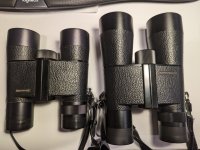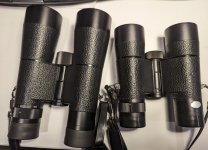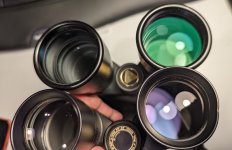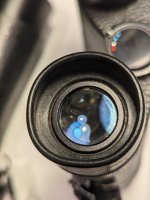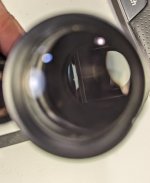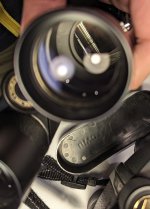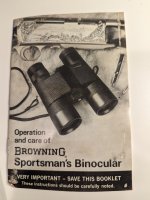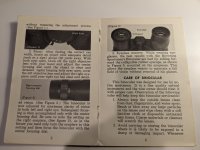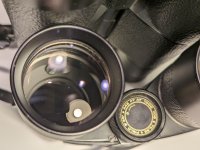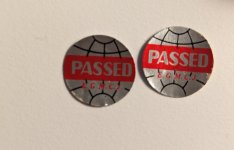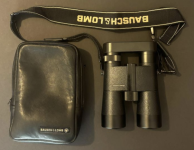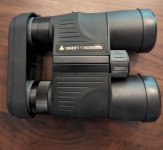I wanted to share a few pictures of my 8x42 B&L Elite. I picked it up recently and I have to say, I truly enjoy the views it provides and the look of it. The proportions seem spot on.
I feel very immersed in the image when looking through this pair. I am now always reaching for it over other (limited...) options. It provides great clarity with high resolution for even the finest of details. I am blown away by how it can maintain a very sharp focus in one plane, while at the same time keeping an only slightly less precise focus over a significantly large depth of field.
It's like everything is in focus, all at once, (of course it's not really true, but immersive) with only tiny twists of the focus knob to get to an incredible detailed view of a given plane.
The center holds the best view and towards the edges there is quite a drop off but you have to go looking for it. The clear central real estate is large enough to satisfy, not sure on percentage maybe 75-80.
Compared to a modern Nikon Monarch M5 8x42 there is a hint of a 3-D feel to the image these provide, but not so much as some porros like the old Legacy 7x35 wide angles.
The M5 has a narrower field of view but it is brighter, higher contrast, the colors warmer and appear higher chroma. Great views but where it falls apart compared to this 36 years old B&L Elite is on the feeling of immersion (shallower depth of field) and the sharpness of resolving to see the finest of details.
This last part surprised me, because I assumed the phase coated M5s would have a higher resolution image. They do not, and so I am left wondering what this B&L's are missing due to their lack of phase coating. Maybe it's the color or contrast that benefits? Because the detailed resolution is so remarkable, I am looking forward to see something much better. I have a Conquest HD on order and am looking for a Monarch HG. Should be a fun comparison.
Anyhow just wanted to share this one and also say thanks to those who have posted here on the forum about the old B&L Elites. It helped me to learn something about them and helped prompt me to secure this pair.
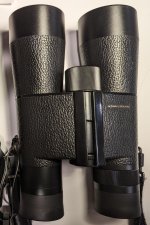
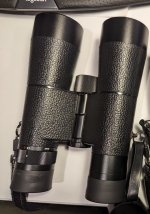
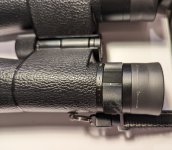
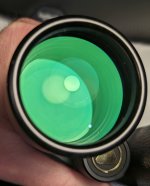
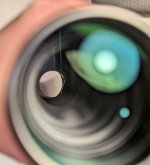
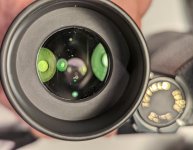
I feel very immersed in the image when looking through this pair. I am now always reaching for it over other (limited...) options. It provides great clarity with high resolution for even the finest of details. I am blown away by how it can maintain a very sharp focus in one plane, while at the same time keeping an only slightly less precise focus over a significantly large depth of field.
It's like everything is in focus, all at once, (of course it's not really true, but immersive) with only tiny twists of the focus knob to get to an incredible detailed view of a given plane.
The center holds the best view and towards the edges there is quite a drop off but you have to go looking for it. The clear central real estate is large enough to satisfy, not sure on percentage maybe 75-80.
Compared to a modern Nikon Monarch M5 8x42 there is a hint of a 3-D feel to the image these provide, but not so much as some porros like the old Legacy 7x35 wide angles.
The M5 has a narrower field of view but it is brighter, higher contrast, the colors warmer and appear higher chroma. Great views but where it falls apart compared to this 36 years old B&L Elite is on the feeling of immersion (shallower depth of field) and the sharpness of resolving to see the finest of details.
This last part surprised me, because I assumed the phase coated M5s would have a higher resolution image. They do not, and so I am left wondering what this B&L's are missing due to their lack of phase coating. Maybe it's the color or contrast that benefits? Because the detailed resolution is so remarkable, I am looking forward to see something much better. I have a Conquest HD on order and am looking for a Monarch HG. Should be a fun comparison.
Anyhow just wanted to share this one and also say thanks to those who have posted here on the forum about the old B&L Elites. It helped me to learn something about them and helped prompt me to secure this pair.













